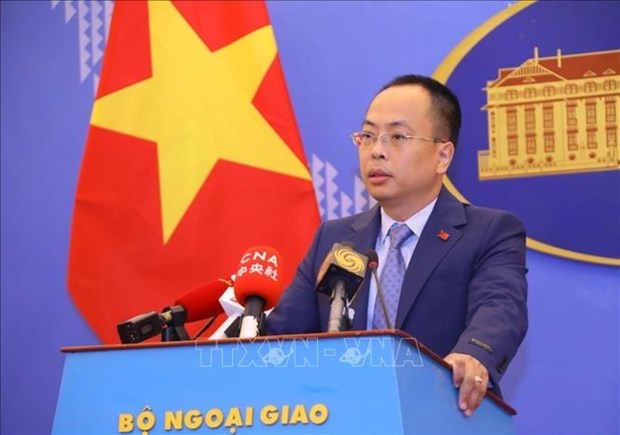
Vice spokesperson of the Foreign Ministry Doan Khac Viet. (Photo: VNA)
Under the instruction of the Foreign Ministry, the Vietnamese Consulate General in China’s Shanghai city contacted and held working sessions with competent agencies of Shanghai, asking for the suspension, Vice spokesperson of the Foreign Ministry Doan Khac Viet told the press on April 20.
The Consulate General also asked Shanghai to provide information about the ordination documents, Viet said, stressing that the ministry will coordinate with the Ministry of Culture, Sports and Tourism (MCST), concerned localities and Vietnam’s representative offices abroad to continue keeping a close watch on the case, and take further countermeasures.
According to the MCST, Shanghai Yangming Auction Co., Ltd posted information about 12 royal ordination documents expected to be put up for auction on April 22, on its website. Among them, three may be originated from a temple in Di Nau commune, Tam Nong district, the northern midland province of Phu Tho, and nine are likely from Hanoi, and the northern provinces of Bac Ninh, Ha Nam and Hai Duong. There are also many other royal ordination documents and objects listed for auction on the website that may be associated with relic sites in different Vietnamese localities.
Royal ordination was a type of administrative documents issued by Kings to confer or elevate titles for individuals who rendered great service, or outstanding mandarins.
Such documents have been preserved at historical relic sites as cultural heritage which holds significance in many aspects, not only in science but also in the spiritual life of Vietnamese people.
Both Vietnam and China are members of the 1970 UNESCO Convention on the Means of Prohibiting and Preventing the Illicit Import, Export and Transfer of Ownership of Cultural Property, under which member states committed “at the request of the State Party of origin, to take appropriate steps to recover and return any such cultural property imported after the entry into force of this Convention in both States concerned”./. VNA
The Consulate General also asked Shanghai to provide information about the ordination documents, Viet said, stressing that the ministry will coordinate with the Ministry of Culture, Sports and Tourism (MCST), concerned localities and Vietnam’s representative offices abroad to continue keeping a close watch on the case, and take further countermeasures.
According to the MCST, Shanghai Yangming Auction Co., Ltd posted information about 12 royal ordination documents expected to be put up for auction on April 22, on its website. Among them, three may be originated from a temple in Di Nau commune, Tam Nong district, the northern midland province of Phu Tho, and nine are likely from Hanoi, and the northern provinces of Bac Ninh, Ha Nam and Hai Duong. There are also many other royal ordination documents and objects listed for auction on the website that may be associated with relic sites in different Vietnamese localities.
Royal ordination was a type of administrative documents issued by Kings to confer or elevate titles for individuals who rendered great service, or outstanding mandarins.
Such documents have been preserved at historical relic sites as cultural heritage which holds significance in many aspects, not only in science but also in the spiritual life of Vietnamese people.
Both Vietnam and China are members of the 1970 UNESCO Convention on the Means of Prohibiting and Preventing the Illicit Import, Export and Transfer of Ownership of Cultural Property, under which member states committed “at the request of the State Party of origin, to take appropriate steps to recover and return any such cultural property imported after the entry into force of this Convention in both States concerned”./. VNA